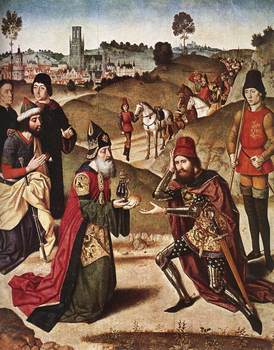
The Roman Martyrology lists one of the saints for today as Melchizedek, the righteous King of Salem who offered bread and wine to God in worship. Melchizedek means the King of Justice or King of Peace; "Salem" is the root word for Jerusalem. Melchizedek is also remembered in the Roman Canon of the Mass when the priest prays, "...according to the order of Melchizedek." The Church's commemoration of this mysterious King of Salem reminds us that Melchizedek is a bridge between the Old and New Testaments; he is the first priest of the Old Testament mentioned in sacred Scripture and St. John Chrysostom even speaks of the King as "the perfect image of the Savior," that is, he's an Old Testament type, a foreshadowing of Jesus Christ as priest and king.
In a homily Bishop Photius of Lyons in part says of Melchizedek:
St. John Chrysostom says: "Melchizedek was righteous and the faithful image of Christ. Moved by a prophetic spirit, he discerned the oblation which must one day be offered for the Gentiles, and, in the example of the future Christ, he offered bread and wine as sacrifice to God. But, the Judaic synagogue, which honored God according to the order of Aaron, offered Him a sacrifice, not of bread and wine, but of bulls and lambs and glorified the Lord by bloody sacrifices. That is why God, addressing Himself to the One Who was to be born of the Virgin Mary, Jesus Christ, His Son, says to Him, `You are Priest forever according to the order of Melchizedek' and not according to the order of Aaron, who honors his God while offering Him bulls and heifers" (Op. cit., p.482-483). St. Ambrose draws the conclusion that the Christian worship is more ancient than that of the Law since it is Melchizedek, the image of Christ, who brings the bread and the wine, not Abraham (Cf "Dictionnaire de Spiritualite", col. 971. St. Ambrose, "De Sacramentis", IV, 8, 10-11; "De Mysteriis", 8, 44-45).
That the figure of
Melchizedek is fulfilled in the Lord Jesus Christ, the Fathers all hold to the
fact that He alone is truly `without genealogy': "The Son of God,"
says St. John Chrysostom, "is without father and without mother; without father
as to His earthly genesis; without mother as to His heavenly genesis"
("Homelie sur Melchizedek", op. cit., p.479. Cf. also
"Expication des Psaumes", Ps. CIX, ibid., p.332). If then the
Scriptures say of Melchizedek that he was `without genealogy', it is not at all
that in reality he did not have parents, "because", says St. John
Chrysostom, "we maintain that Melchizedek is not only a man like us . .
. but as Melchizedek was the type of Christ, Whose image he bore, in the
same way was Jonas. The Scriptures had not spoken of his father, so that
he might offer us a perfect image of the Saviour Who alone, in truth, has
neither father nor genealogy" (Ibid., p.482). Likewise, in his
homily on the Psalm of David, he says: "That which Melchizedek was in figure,
Jesus Christ was in reality, and the name of Melchizedek was like the names of
Jesus and of Christ, which long in advance announced and prefigured the mission
of the Saviour. When we read that Melchizedek had neither beginning nor
end of his life, it is not that in reality he had had neither beginning nor
end, but because no trace is found of his genealogy. Jesus, on the
contrary, had in truth no beginning of His days, nor end of His life. His
existence had no time, no beginning, no end. One was the figure, the other
the truth" (Id.,"Oeuvres Completes", t.IX, p.332).
Blessed John Henry Newman was enchanted by the mysteriousness of the priest and king Melchizedek who composed a poem, "Melchizedek":
Without father, without mother, without descent; having neither beginning of days, nor end of life.
Thrice bless'd are they, who fell their lonliness;
To whom nor voice of friends nor pleasant scene
Brings that on which the sadden'd heart can lean;
Yea, the rich earth, garb'd in her daintiest dress
Of light and joy, doth but the more oppress,
Claiming responsive smiles and rapture high;
Till, sick at heart, beyond the veil they fly,
Seeking His Presence, who alone can bless.
Such, in strange days, the weapons of Heaven's grace;
When, passing o'er the high-born Hebrew line,
He forms the vessel of His vast design;
Fatherless, homeless, reft of age and place,
Sever'd from earth, and careless of its wreck,
Born through long woe His rare Melchizedek.
Nicholson & Lee, eds. The Oxford Book of English Mystical Verse, 1917.


Leave a comment